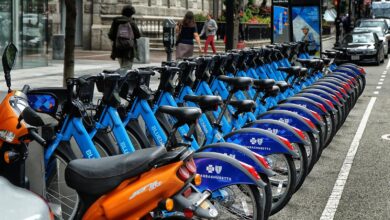Boston’s Shift to Renewable Energy: Progress and Challenges

Boston has made notable strides in shifting towards renewable energy, driven by both environmental concerns and economic incentives. Boston has set ambitious goals to reduce greenhouse gas emissions. Mayor Marty Walsh announced a goal for Boston to be carbon neutral by 2050, with significant milestones along the way. In Boston, the pursuit of renewable energy targets plays a crucial role in the city’s broader sustainability efforts.
Boston has set a bold target to achieve carbon neutrality by 2050. According to Mayor’s Office of Energy, Environment, and Open Space, “Boston is committed to becoming a carbon-neutral city by 2050, which includes transitioning to 100% renewable energy sources.” This overarching goal encompasses reducing greenhouse gas emissions across all sectors, including energy production, transportation, and buildings. The city has committed to sourcing 100% of municipal electricity from renewable sources by 2025. This target drives the adoption of clean energy within city operations and facilities.
Massachusetts, where Boston is located, has established a Renewable Portfolio Standard requiring utilities to procure a certain percentage of their electricity from renewable sources. This indirectly supports Boston’s renewable energy goals. Boston has implemented various programs to encourage solar installations, including incentives for residents and businesses to adopt solar energy systems. These initiatives contribute to increasing renewable energy capacity within the city.
Alongside renewable energy targets, Boston emphasizes energy efficiency measures to reduce overall energy consumption and enhance the effectiveness of renewable energy investments. Boston supports community solar projects, allowing residents who may not have suitable roofs for solar panels to benefit from renewable energy generation elsewhere in the city. The city promotes the construction of green buildings that incorporate renewable energy technologies, energy-efficient design, and sustainable practices.
In addition to renewable electricity goals, Boston encourages the adoption of electric vehicles through infrastructure development and incentives, reducing emissions from the transportation sector. There has been a significant increase in solar installations across the city, including on residential, commercial, and municipal buildings. Wind energy projects, although limited due to urban constraints, are also being explored. Boston has been actively pursuing initiatives to harness solar and wind energy as part of its renewable energy strategy.
The solar and wind initiatives in Boston.program aims to increase the adoption of solar energy among residents and businesses by offering group-buying discounts, streamlined permitting processes, and educational outreach. It encourages the installation of solar photovoltaic (PV) systems on rooftops. The city provides an interactive map that helps residents and businesses assess the solar potential of their rooftops. It provides information on solar resources, incentives, and financing options available in Boston.
This initiative expands access to renewable energy for those who cannot install solar panels on their own properties. The city integrates solar energy into affordable housing developments to reduce energy costs for residents and promote sustainability in low-income communities. Although Boston’s urban environment limits large-scale wind projects, the city explores opportunities for small-scale wind turbines and offshore wind energy. Offshore wind farms in nearby waters are considered as part of Massachusetts’ broader renewable energy goals.
Boston advocates for state and federal policies that promote offshore wind energy development. The city supports projects like the Vineyard Wind offshore wind farm, which contributes to the regional supply of renewable electricity. According to Boston Energy Office “We’ve seen a significant increase in solar installations across Boston, with a growing number of homes, businesses, and public buildings embracing renewable energy.” Boston has implemented various energy efficiency programs aimed at reducing overall energy consumption in buildings, which contribute significantly to emissions reduction.
Boston offers free or subsidized home energy assessments through programs like Mass Save. These assessments help homeowners identify energy-saving opportunities and access incentives for energy-efficient upgrades. Low-income residents may qualify for weatherization services that improve home insulation, seal air leaks, and install energy-efficient heating and cooling systems to reduce energy costs and enhance comfort. Residents can take advantage of rebates and incentives for purchasing energy-efficient appliances, HVAC systems, and lighting fixtures. These programs are often coordinated with utility companies and state initiatives.
Building Energy Reporting and Disclosure Ordinance (BERDO) requires large buildings in Boston to report their energy usage annually. It aims to encourage energy efficiency improvements and transparency in energy performance. Introduction of Commercial Energy Efficiency Programs where Businesses and institutions can participate in programs that offer incentives and technical assistance for upgrading to energy-efficient lighting, HVAC systems, building controls, and renewable energy installations.Managed by the Environment Department, Greenovate Boston engages businesses, institutions, and residents in sustainability initiatives, including energy efficiency projects and greenhouse gas reduction efforts.
Boston leads by example through energy efficiency upgrades in city-owned buildings. This includes retrofitting lighting, HVAC systems, and implementing energy management strategies to reduce municipal energy consumption. Similar to the residential program, Renew Boston Trust for Schools supports energy efficiency upgrades in Boston Public Schools, enhancing comfort and reducing operating costs.
Boston collaborates with Mass Save, a statewide initiative, to deliver energy efficiency programs and services to residents, businesses, and institutions. This partnership offers comprehensive energy assessments, incentives, and financing options. Boston’s Energy Efficiency Advisory Council advises the city on energy policy and program development, ensuring alignment with local sustainability goals and best practices.
Boston has committed to sourcing 100% of municipal electricity from renewable sources by 2025. This target drives the adoption of clean energy within city operations and facilities. Massachusetts has a Renewable Portfolio Standard (RPS) that requires utilities to procure a certain percentage of their electricity from renewable sources. This indirectly supports Boston’s renewable energy goals.
Boston’s dense urban environment poses challenges for large-scale renewable energy projects like wind farms. Space limitations make it difficult to implement certain renewable energy solutions. Urban density and space constraints pose significant challenges to implementing renewable energy initiatives in Boston. Many buildings in Boston, especially older ones, have limited rooftop areas suitable for solar panel installations. This restricts the potential capacity for generating solar power within the city.
Tall buildings and narrow streets can create shading issues, reducing the efficiency of solar panels. Proper orientation and unobstructed sunlight are crucial for maximizing solar energy generation. Large-scale wind turbines are generally impractical due to the city’s dense urban environment. Tall buildings disrupt wind flow patterns, making it challenging to generate sufficient wind energy in urban areas.
Urban areas prioritize space for residential, commercial, and infrastructure needs, leaving little available land for renewable energy installations like ground-mounted solar arrays or wind farms. Zoning laws and building codes may limit the size and placement of renewable energy systems, complicating efforts to scale up installations within city limits. Integrating intermittent renewable energy sources into the existing urban grid infrastructure requires upgrades to handle fluctuations in supply and demand. This involves investments in smart grid technologies and energy storage solutions.
Urban installations often require additional engineering and structural considerations, increasing upfront costs for renewable energy projects compared to rural or suburban areas. Achieving economies of scale can be more challenging in urban settings, where smaller project sizes and higher costs per unit of energy produced may hinder cost competitiveness. Advancements in building-integrated photovoltaics (BIPV) and small-scale wind turbines tailored for urban environments can help maximize renewable energy generation within limited space.
Encouraging community solar projects allows residents and businesses without suitable rooftops to participate in renewable energy generation, leveraging available space more effectively. Continued support for policies that streamline permitting processes, provide financial incentives, and address regulatory barriers can facilitate renewable energy deployment despite urban challenges. Transitioning to renewable energy can be expensive upfront, although costs are decreasing. Securing funding and financing mechanisms for renewable projects remains a challenge.
In Boston, like many other places, the adoption of renewable energy faces several challenges, among which cost and funding are significant. Renewable energy sources such as solar panels or wind turbines require significant upfront investment for installation. While the long-term operational costs are lower than traditional energy sources, the initial capital expenditure can be a barrier, especially for individuals or businesses with limited financial resources.
Securing financing for renewable energy projects can be challenging. Although there are various incentives, grants, and tax credits available, navigating these options and accessing them requires expertise and time. Many smaller businesses or households may find it difficult to qualify for these financial supports or may be unaware of how to effectively utilize them. While renewable energy systems generally have a favorable ROI over their operational lifespan, the payback period can be longer compared to conventional energy sources.
In some cases, there may be a lack of awareness or misconceptions about the benefits and affordability of renewable energy technologies. Educating the public about the long-term cost savings and environmental benefits of renewable energy can help increase acceptance and support for these initiatives. Addressing these challenges requires a multi-faceted approach involving government policies that support renewable energy development, financial mechanisms that facilitate access to capital, and public awareness campaigns to promote the benefits of sustainable energy solutions.
Boston’s shift towards renewable energy is a multifaceted effort involving government initiatives, technological advancements, and community engagement. While progress has been made, addressing challenges such as urban constraints, funding issues, grid integration, and public education will be crucial for achieving long-term sustainability goals. Continued innovation and collaboration among stakeholders will be essential to overcoming these challenges and advancing towards a cleaner, more sustainable energy future for Boston.



